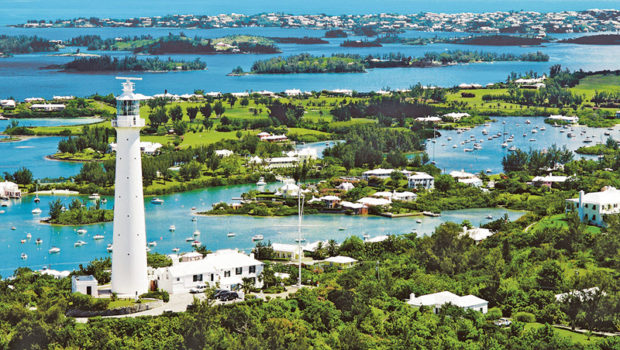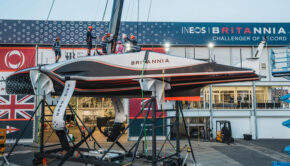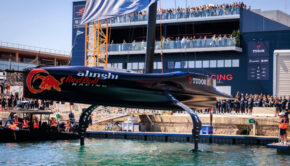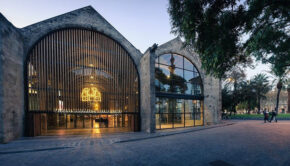Bermuda Relying on Economics of the America’s Cup
Published on October 26th, 2016
While cities from Hamburg to Boston bristle at the thought of hosting large, expensive sports events such as the Summer Olympics, street parties were held in Bermuda when the island won the right to host next year’s America’s Cup.
After five years of recession, Bermudians hope the world’s oldest continuous sporting event will kick-start the economy of this small British overseas territory, east of South Carolina, known for its blue waters, pink sand beaches and shorts.
“We see the America’s Cup as a bridge to new opportunity, a reset of the way Bermuda is viewed as a tourism, event and first world jurisdiction,” said Michael Winfield, chief executive of America’s Cup Bermuda (ACBDA) which is organizing the event.
Winfield said he’s already seen “a significant up-tick in new sailing regattas” since 2014, when Bermuda beat San Diego for the right to host the America’s Cup.
The eyes of the sporting world will be on Bermuda next June when the azure waters of the Great Sound host defending champion Oracle Team USA against the winner of the Louis Vuitton Challenger Series in the 35th edition of the historic contest.
Bermuda, made up of 181 islands in the North Atlantic, is forking out $77 million on the event, which includes a $15 million sponsorship fee, $25 million on infrastructure improvements and new facilities such as the event village at the Royal Naval Dockyard that’s being built on a nine acre plot of reclaimed land and $12 million in operating costs.
The archipelago also had to underwrite a $25 million guarantee against commercial sponsorship.
Organizers estimate the economic benefit of hosting may be as high as $250 million, which will be generated by competing teams moving to Bermuda, additional visitors before and during the Cup, media exposure and big-spending superyachts and its owners coming to Bermudan shores.
Although the America’s Cup is a great way to showcase a city or country, costs have often overrun while the predicted benefits have at times been greatly exaggerated.
Take San Francisco, which staged the last America’s Cup in 2013. A Bay Area Council Economic Institute report after the event said it generated as much as $550.8 million in economic activity, which included the construction of a new cruise ship terminal at Pier 27.
Although that’s a significant amount, it was far less than the $1.4 billion promised in 2010 and the $900 million forecast a few months before the races began, according to the San Francisco Chronicle.
The 34th America’s Cup ended up costing San Francisco tax payers around $6 million. It attracted more than 700,000 visitors and created up to 3,800 full-time jobs to the city.
Just like in San Francisco, the arrival of the America’s Cup rejuvenated parts of Auckland and Valencia in previous contests.
The 2003 event in New Zealand prompted the regeneration of Auckland’s rundown Viaduct Harbor area, which was turned into a hub with dozens of bars, restaurants and hotels that pulls in hundreds of thousands of visitors a year.
The legacy of hosting the 2007 races in Spain included the transformation of a part of Valencia’s old port into a 700-berth marina with bars and restaurants.
Stripping away government spending on infrastructure projects, San Francisco had an economic benefit of $364.4 million, the Bay Area Council said. That compares to $346 million for Auckland and $1.1 billion for Valencia.
Valencia also hosted the 2010 event, which was a controversial “Deed of Gift” challenge between just two syndicates after a lengthy court battle centered on regatta protocol.
Although the 2013 races had a thrilling finish with defending champion Oracle USA staging a comeback from 8-1 down to defeat Emirates Team New Zealand, the $100 million price tag for the state-of-the-art AC72 boats meant only three challengers took part, far fewer than during previous editions.
“Spending and revenues are highly dependent on the number of syndicates participating,” the Bay Area report concluded.
With only 60,000 residents, much will depend on foreign visitors coming to Bermuda. In recent years, the island has been transforming itself from a banking hub into a hip, sporty tourist destination as it promotes anything from boating to cliff jumping and cave diving.
The early signs have been good. The Bermudian economy, which contracted 3.3% a year on average between 2009 and 2014, grew 1.5% in 2015, according to credit rating agency Moody’s.
“Positive economic momentum should carry into 2016 and 2017 supported by increased tourism activity related to the 2017 America’s Cup, as well as by increased investment on tourism-related and public infrastructure projects,” Moody’s said in a report in June.
This month, travel guide Lonely Planet ranked Bermuda as sixth in its top 10 of countries to visit next year.
Welcoming the America’s Cup trophy to the island in 2014, Bermuda Premier Michael Dunkley called the event the catalyst needed to propel Bermuda into a prosperous future.
“There is work to be done and jobs to be had,” Dunkley said. “There will be opportunities for Bermudians in every level of our workforce; including international business, law, real estate, restaurateurs and hospitality, construction … the list is endless, and we see all Bermudians benefiting from the America’s Cup.”
Although Bermuda is a bit off the beaten track compared to previous hosts — and marks a break with tradition that dictates the Cup winners will host the next event in their waters, sailing fans won’t be disappointed, according to America’s Cup historian John Rousmaniere.
“I’ve been out to the site, where they set up for the boats,” Rousmaniere said. “The sailing area is wonderful, it’s essentially a big bay surrounded by a beautiful reef where they can do short courses very well.
“You generally get very good wind in Bermuda and nobody is more hospitable than Bermudians. So I think it’s going to work out. But it is a bit of a novelty here.”
Source: Gant Daily









 We’ll keep your information safe.
We’ll keep your information safe.